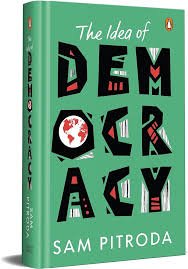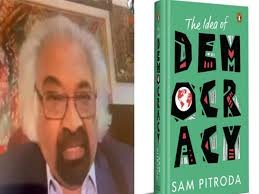Sam Pitroda’s New Book: “The Idea of Democracy”
In the realm of contemporary political literature, Sam Pitroda’s latest offering, “The Idea of Democracy,” has stirred significant interest and discussion. With a career spanning decades as a technocrat, advisor, and political strategist, Pitroda’s insights into democracy carry weight. The book, released amidst a backdrop of global democratic challenges, delves into the essence of democracy, its evolution, and its implications in a rapidly changing world.
Pitroda begins by tracing the historical roots of democracy, emphasizing its ancient origins and its evolution through various forms of governance. He contextualizes the modern democratic framework within the broader spectrum of political ideologies, highlighting its fundamental principles of representation, participation, and accountability.
One of the central themes of Pitroda’s book is the role of technology in shaping contemporary democracies. He explores how digital advancements have revolutionized governance, communication, and civic engagement, while also posing new challenges such as privacy concerns and misinformation.
Moreover, Pitroda critically examines the state of democracy in the 21st century, pointing out its vulnerabilities to populism, authoritarianism, and socio-economic disparities. Through insightful analysis, he underscores the importance of safeguarding democratic institutions, fostering inclusive political cultures, and promoting active citizenship.
Overall, “The Idea of Democracy” serves as a thought-provoking exploration of the essence, challenges, and future prospects of democracy. It resonates not only with scholars and policymakers but also with citizens aspiring for a more just, equitable, and participatory society.

Why this News is Important:
Relevance of Sam Pitroda’s New Book
Sam Pitroda’s latest book, “The Idea of Democracy,” holds significant importance amidst the current global political landscape. In an era marked by democratic backsliding and growing disillusionment with traditional political systems, Pitroda’s insights offer valuable perspectives on the essence and challenges of democracy.
Insights into Democratic Principles
Pitroda’s exploration of democracy’s historical roots and core principles provides readers with a nuanced understanding of its significance. In an age where democratic norms are increasingly under scrutiny, such insights are invaluable for fostering informed civic discourse.
C) Historical Context:
Evolution of Democracy
Democracy traces its roots back to ancient civilizations such as Greece and Rome, where concepts of citizen participation and rule by the people emerged. Over centuries, democracy evolved through various forms of governance, including direct democracy, representative democracy, and constitutional republics.
Technological Advancements and Democracy
The advent of modern technologies, particularly the internet and social media, has revolutionized the dynamics of democratic participation. These innovations have facilitated greater citizen engagement, transparency in governance, and access to information, albeit with accompanying challenges such as digital polarization and privacy concerns.
Key Takeaways from “The Idea of Democracy”:
| Serial Number | Key Takeaway |
|---|---|
| 1. | Democracy has ancient origins and has evolved over centuries. |
| 2. | Technology plays a significant role in shaping modern democracies. |
| 3. | Pitroda emphasizes the importance of safeguarding democratic institutions. |
| 4. | The book highlights challenges such as populism and socio-economic disparities to democracy. |
| 5. | Pitroda advocates for fostering inclusive political cultures and active citizenship. |
Important FAQs for Students from this News
1. What is the central theme of Sam Pitroda’s book, “The Idea of Democracy”?
- Answer: The central theme revolves around the essence, challenges, and future prospects of democracy in the modern world.
2. How does Pitroda discuss the role of technology in shaping democracies?
- Answer: Pitroda explores how advancements in technology have revolutionized governance, communication, and civic engagement, while also posing new challenges such as privacy concerns and misinformation.
3. What are some key historical contexts mentioned in the article?
- Answer: The article discusses the evolution of democracy from ancient civilizations and the impact of technological advancements on democratic principles.
4. Why is Pitroda’s book relevant in the current political landscape?
- Answer: Pitroda’s insights offer valuable perspectives on democratic principles amidst growing concerns about democratic backsliding and disillusionment with traditional political systems.
5. What are the key takeaways from “The Idea of Democracy”?
- Answer: The key takeaways include the importance of safeguarding democratic institutions, addressing challenges like populism and socio-economic disparities, and advocating for inclusive political cultures and active citizenship.
Some Important Current Affairs Links


















 Exciting News!
Exciting News!  Join Our Telegram Channel Now!
Join Our Telegram Channel Now!
 Join our Telegram channel for a thrilling adventure into the world of daily current affairs.
Join our Telegram channel for a thrilling adventure into the world of daily current affairs. 
 Don’t miss out on the latest updates and insights! Click to join now and be part of the knowledge revolution!
Don’t miss out on the latest updates and insights! Click to join now and be part of the knowledge revolution! 
